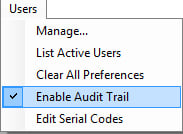Food safety and quality remain of utmost importance to the food industry. From prioritizing traceability and visibility within your supply chain, to having a proper food recall plan in place, to staying up to date with the latest regulations for compliance, it is imperative for food companies to take a proactive approach to create a safer global food supply chain for all.
 The Food and Drug Administration’s (FDA) Food Safety Modernization Act (FSMA) of 2011 takes a prevention-oriented approach to food safety and requires food processing firms to enforce several preventive controls.
The Food and Drug Administration’s (FDA) Food Safety Modernization Act (FSMA) of 2011 takes a prevention-oriented approach to food safety and requires food processing firms to enforce several preventive controls.
Additionally, the recent passing of FSMA Section 204 sets documentation standards for businesses that pack, store, or otherwise handle “high-risk” foods on the FDA’s Food Traceability List (FTL). Starting in 2026, businesses will need to record having a traceability plan in place, among other records, in the event that the FDA conducts an investigation, recall, or audit. (Your traceability plan is separate from a food recall plan or a food safety plan – it’s easy to see how this can get confusing, right?)
While companies take these preventative measures to avoid an FDA inspection or audit, there is still a possibility that the FDA will step in to conduct an audit in the event of non-compliance. If that’s the case, here are some of the things you can expect from an FDA audit in the New Era of Food Safety.
What is an FDA Audit?
Inspections – or audits – are conducted to ensure compliance with FDA laws and regulations. There are various types of FDA audits:
- Pre-approval inspections, for when a company submits a request to market a new product
- Routine inspections, where the FDA conducts a visit based on a predetermined level of risk the facility presents
- Compliance (follow-up) inspections, where the FDA must determine if a facility has responded to a previous investigation
- And for-cause inspections, where the FDA responds to a report or compliance issue noted at the facility
If the FDA is responding to a non-compliance or food quality issue, they may visit your facility to conduct a for-cause inspection. During this audit, an investigator comes to your facility for a formal inspection to ensure your business is following good manufacturing practices, properly documenting processes and records, and keeping equipment and facilities in good condition, among other things.
What is Included During an Inspection?
Here are some of the aspects companies can expect during an FDA audit:
- Record Review: The FDA inspector will likely review your documents and records, including any records related to food safety, labeling, and ingredient sourcing. They may also review your food safety plans, such as your hazard analysis and critical control point (HACCP) plan, to ensure they are in compliance with regulations.
- After the FSMA 204 compliance date (January 20, 2026), businesses may also need to include their traceability plan if the FDA requests it, as well as all the documentation outlined by FSMA 204 related to foods on the FTL, such as critical tracking events (CTEs) and more, within 24 hours of an FDA request.
- Facility Inspection: The FDA inspector will check to ensure you are following good manufacturing practices and keeping your facility in good working condition, ensuring equipment is sanitary, properly maintained, and in working order.
- Label Examination: The FDA inspector will review a product’s label to determine compliance with labeling requirements, such as accurate labeling of allergens, ingredients, and other additives.
- Sample Collection: The inspector may collect samples of your products and ingredients for further testing to determine if the product meets public health standards; part of this requires sending samples to an FDA laboratory for analysis. Samples are collected when there is risk associated with a product, if the product or manufacturer has a history of past violations, or for routine surveillance.
- Employee Interviews: The FDA inspector may interview employees to gain a better understanding of current operations and to verify processes and procedures are in compliance.
What Happens if the FDA Finds a Violation?
If an FDA inspector identifies any violations during the audit, they may issue a Form 483, which lists the violations and notifies company management of the objectionable conditions. Companies are given the opportunity to respond to the Form 483 in writing with a corrective action plan detailing how they will mitigate the violation and implement that corrective action plan as soon as possible.
If necessary, the inspector may conduct a follow-up inspection to verify issues have been resolved; if they have not been, a company can receive warning letters or fines, and even be required to issue a food product recall, which can cost your company significantly in time, expenses, and brand damage.
Three Tips to Prepare for an Audit
Preventative action toward food safety is at the core of FSMA, so it is key to ensure that you are prepared and organized for an FDA audit – whether you are expecting one or not. This includes having the necessary documents on hand, ensuring your employees are trained on food safety and regulations, and understanding the various components of an FDA inspection.
Here are three considerations when preparing for an FDA audit:
- Perform mock audits: There’s no better way to prepare for an actual inspection than to simulate one. Performing mock audits will allow your team to visualize how a real FDA audit might go. During a mock audit, assess inspection guides for your product categories, study the guidelines and procedures carefully, and ensure your team is confident and knowledgeable of what action to take during a real audit.
- Invest in staff training: Having a well-trained staff is crucial for success. It is important to identify representatives who will interact with the FDA officials and designate specific roles ahead of time. Non-participating staff should also be updated on inspection procedure.
- Look out for the problem areas: A look at some of the FDA citations and warning letters for inspected factories reveals these common problems:
- Lack of HACCP plan implementation or monitoring,
- Poorly trained personnel,
- Incomplete records/documentation, and
- Inadequate traceability measures.
It is good practice to study warning letters issued to closely related businesses and address problem areas relevant to your business to best prepare for an FDA audit.
Adopt the Right Technology Today
Beyond food safety, a failed FDA audit could greatly tarnish a brand’s image and negatively impact revenue. Lack of proper documentation and process controls are some of the major challenges encountered by food companies during an inspection. One core tenet of the FDA’s New Era for Smarter Food Safety is leveraging technology to create a safer food system, including responding more rapidly and efficiently to outbreaks to protect consumers.
Adopting the right technology can make it easier to manage food safety audits and ease regulatory compliance. A software solution can also help you more effectively perform mock audits, train staff members, and identify problem areas – all preventative efforts that can be taken to better prepare for or respond to an FDA audit. For more information on how FoodLogiQ can help your organization with FDA audits in the era of FSMA, contact our experts today.
Other posts you might be interested in
View All Posts
Food Safety
10 min read
| November 11, 2020
Adapting Your Auditing Strategy to Account for Leaner Operations
Read More
Trustwell Software
3 min read
| June 14, 2017
How to Use the Audit Trail Feature in Genesis R&D Food
Read More
Food Safety
4 min read
| January 7, 2021

